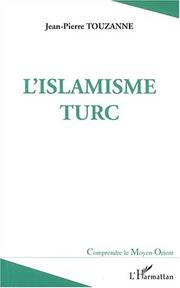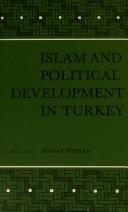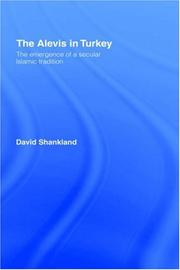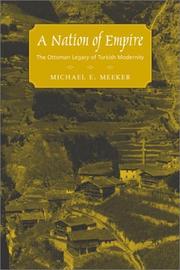| Listing 1 - 9 of 9 |
Sort by
|
Book
ISBN: 9780521191166 9781139022385 9780521138505 Year: 2019 Publisher: Cambridge Cambridge University Press
Abstract | Keywords | Export | Availability | Bookmark
 Loading...
Loading...Choose an application
- Reference Manager
- EndNote
- RefWorks (Direct export to RefWorks)
Since the 1980 military coup in Turkey, much of the history and politics of the country can be described as a struggle between democracy and authoritarianism. In this accessible account of the country's politics, society, and economics, the authors delve into the causes and processes of what has been called a democratic 'backsliding'. In order to explore this, the authors focus on the mutual distrust between the secular and Islamist groups. They argue that the attempts by a secular coalition to circumscribe the Islamists in power had a boomerang effect. The Islamists struck back first in self-defence, then in pursuit of authoritarian power. With chapters on urbanization, Kurdish nationalism, women's movements, economic development, and foreign relations, this book offers a comprehensive and lively examination of contemporary Turkey and its role on the global stage.

ISBN: 2747502775 9782747502771 Year: 2001 Publisher: Paris : L'Harmattan,
Abstract | Keywords | Export | Availability | Bookmark
 Loading...
Loading...Choose an application
- Reference Manager
- EndNote
- RefWorks (Direct export to RefWorks)
Islam --- Turkey --- Turquie --- Politics and government --- Politique et gouvernement --- Islam and politics --- Islam and state --- Islam - Turkey --- Islam and politics - Turkey --- Islam and state - Turkey
Book
ISBN: 9780521760218 9781107617728 0521760216 9780511711923 9780511712609 051171260X 0511711921 1107207770 0511846606 1283149524 0511713436 9786613149527 0511714688 0511715935 0511722745 1107617723 Year: 2010 Publisher: New York Cambridge University Press
Abstract | Keywords | Export | Availability | Bookmark
 Loading...
Loading...Choose an application
- Reference Manager
- EndNote
- RefWorks (Direct export to RefWorks)
The Mobilization of Political Islam in Turkey explains why political Islam, which has been part of Turkish politics since the 1970s but on the rise only since the 1990s, has now achieved governing power. Drawing on social movement theory, the book focuses on the dominant form of Islamist activism in Turkey by analyzing the increasing electoral strength of four successive Islamist political parties: the Welfare Party; its successor, the Virtue Party; and the successors of the Virtue Party: the Felicity Party and the Justice and Development Party. This book, which is based on extensive primary and secondary sources as well as in-depth interviews, provides the most comprehensive analysis currently available of the Islamist political mobilization in Turkey.
Islam and politics --- Turkey --- Politics and government --- Islam --- History. --- Social Sciences --- Political Science --- Islam and politics - Turkey --- Turkey - Politics and government - 1980 --- -Islam and politics
Book
ISBN: 9781845117740 1845117743 Year: 2009 Volume: *3 Publisher: London ; New York I.B. Tauris Publishers
Abstract | Keywords | Export | Availability | Bookmark
 Loading...
Loading...Choose an application
- Reference Manager
- EndNote
- RefWorks (Direct export to RefWorks)
Muslim scholars --- Nurculuk --- Islam --- Islam and politics --- History --- Nursı̂, Said, --- Nursi, Said, --- Muslim scholars - Turkey - Biography --- Islam - Turkey - History --- Islam and politics - Turkey --- Nursı̂, Said, - 1873-1960 --- Nursi, Said, - 1873-1960. - Risale-i nur

ISBN: 9004064710 9789004064713 9789004492141 Year: 1981 Volume: 32 Publisher: Leiden; Boston : BRILL
Abstract | Keywords | Export | Availability | Bookmark
 Loading...
Loading...Choose an application
- Reference Manager
- EndNote
- RefWorks (Direct export to RefWorks)
Islam and politics --- Islam et politique --- Turkey --- Turquie --- Politics and government --- Politique et gouvernement --- Islam and politics - Turkey. --- Turkey - Politics and government - 1909 --- -Islam and politics --- Islam --- Middle East and Islamic Studies --- Mohammedanism --- Muhammadanism --- Muslimism --- Mussulmanism --- Religions --- Muslims
Book
ISBN: 9782130594604 2130594603 Year: 2013 Publisher: Paris : Presses Universitaires de France,
Abstract | Keywords | Export | Availability | Bookmark
 Loading...
Loading...Choose an application
- Reference Manager
- EndNote
- RefWorks (Direct export to RefWorks)
En Turquie, la politique et les médias d'un côté, les marchés et les espaces de loisir de l'autre, témoignent de la montée en puissance d'un nouveau groupe social caractérisé par un style de vie islamique : la nouvelle bourgeoisie islamique. Cet ouvrage présente la formation sociopolitique de celle-ci grâce à l'étude du MÜSIAD (Association des industriels et des hommes d'affaires indépendants), association patronale qui rassemble les dirigeants de PME musulmans et pieux. À travers une enquête auprès de ces acteurs, nous comprenons comment le rapport à l'islam est mobilisé dans l'action politique et l'organisation patronale. La piété s'articule dans la vie professionnelle en fonction des intérêts de l'entrepreneur pour créer des « sélectivités islamiques » qui constituent l'image de marque de cette bourgeoisie dans la gestion des intérêts économiques. Les victoires électorales depuis 2002 du Parti de la Justice et du développement, représentant politique de cette nouvelle bourgeoisie, témoigne de l'enracinement de ce groupe d'intérêt dans les structures de pouvoir et lui permet de façonner les fondements de l'équation politique et du changement social en Turquie.
Social classes --- Middle class --- Islam --- Capitalism --- Islam and politics --- Classes sociales --- Classes moyennes --- Capitalisme --- Islam et politique --- Economic aspects --- Religious aspects --- Aspect économique --- Aspect religieux --- History --- Müstakil Sanayici ve İşadamları Derneği --- Bourgeoisie --- Association des industriels et d'hommes d'affaires indépendants (Turquie) --- Aspect économique --- Islam - Economic aspects - Turkey --- Capitalism - Religious aspects - Islam --- Middle class - Turkey - History - 21st century --- Islam and politics - Turkey
Book
ISBN: 0804771170 9780804771177 9780804761444 0804761442 9780804761451 0804761450 Year: 2009 Publisher: Stanford, Calif Stanford University Press
Abstract | Keywords | Export | Availability | Bookmark
 Loading...
Loading...Choose an application
- Reference Manager
- EndNote
- RefWorks (Direct export to RefWorks)
While Islamic politics pose a challenge to capitalism in some parts of the world, they have actually advanced capitalism and democracy in Turkey. This work looks closely at this transition in Turkey, and examines why this shift has not taken place in Egypt and Iran.
Islam and politics --- Islamic fundamentalism --- Islamic modernism --- Capitalism --- Modernism, Islamic --- Islam --- Fundamentalism, Islamic --- Islamism --- Religious fundamentalism --- Religious aspects --- Islam. --- #SBIB:316.331H330 --- #SBIB:328H215 --- #SBIB:39A10 --- Market economy --- Economics --- Profit --- Capital --- Religious aspects&delete& --- Godsdienst en politiek: algemeen --- Instellingen en beleid: andere Europese landen (Turkije e.a.) --- Antropologie: religie, riten, magie, hekserij --- Political sociology --- Sociology of religion --- anno 1990-1999 --- anno 2000-2009 --- Turkey --- Islam and politics - Turkey --- Islamic fundamentalism - Turkey --- Islamic modernism - Turkey --- Capitalism - Religious aspects - Islam

ISBN: 0700716068 020341750X 9780203417508 9780700716067 9781135789626 1135789622 9781135789572 1135789576 9781135789619 1135789614 9780415444361 0415444365 1280058129 9781280058127 0203419480 9780203419489 Year: 2003 Publisher: London New York RoutledgeCurzon
Abstract | Keywords | Export | Availability | Bookmark
 Loading...
Loading...Choose an application
- Reference Manager
- EndNote
- RefWorks (Direct export to RefWorks)
The example of the Alevis of Turkey is used to contribute to debates over the role of Islam in the modern world. It is argued there is nothing inherently secular-proof within Islam, but belief depends on the wider social and religious context.
Bektashi --- Nosairians --- Shiah --- Shiites --- Sunnites --- Islam and secularism --- Islam and politics --- Relations --- Sunnites. --- Shiites. --- Religion and politics --- Shīʻah --- Shīʻah --- Shīʻah. --- Turkey --- Ethnic relations. --- #SBIB:316.331H300 --- #SBIB:39A10 --- #SBIB:39A72 --- Sunni Muslims --- Sunnis --- Imamites --- Shia --- Shiism --- Twelvers (Islam) --- Secularism and Islam --- Relations&delete& --- Godsdienst en samenleving: algemeen --- Antropologie: religie, riten, magie, hekserij --- Etnografie: Europa --- Islamic sects --- Alids --- Secularism --- Political science --- Politics, Practical --- Politics and religion --- Religion --- Religions --- Religious aspects --- Political aspects --- Bektashi - Turkey. --- Nosairians - Turkey. --- Shiah - Turkey. --- Shiites - Relations - Sunnites. --- Sunnites - Relations - Shiites. --- Islam and secularism - Turkey. --- Islam and politics - Turkey. --- Alevism --- Sunnism --- Susesi --- religion --- ritual --- social control --- social change --- Alevi communities --- Islam --- Shiah.

ISBN: 0520234820 0520225260 9786612759130 0520929128 1282759132 1597347701 9780520929128 0585466378 9780585466378 9780520225268 9780520234826 9781597347709 9781282759138 6612759135 Year: 2002 Publisher: Berkeley, Calif. University of California Press
Abstract | Keywords | Export | Availability | Bookmark
 Loading...
Loading...Choose an application
- Reference Manager
- EndNote
- RefWorks (Direct export to RefWorks)
This innovative study of modern Turkey is the result of many years of ethnographic fieldwork and archival research. Michael Meeker expertly combines anthropological and historical methods to examine the transition from the Ottoman Empire to the Turkish Republic in a major region of the country, the eastern Black Sea coast. His most significant finding is that a state-oriented provincial oligarchy played a key role in successive programs of reform over the course of more than two hundred years of imperial and national history. As Meeker demonstrates, leading individuals backed by interpersonal networks determined the outcome of the modernizing process, first during the westernizing period of the Empire, then during the revolutionary period of the Republic.To understand how such a state-oriented provincial oligarchy was produced and reproduced along the eastern Black Sea coast, Meeker integrates a contemporary ethnographic study of public life in towns and villages with a historical study of official documents, consular reports, and travel narratives. A Nation of Empire provides anthropologists, historians, and students of Eastern Europe and the Middle East with a new understanding of the complexities and contradictions of modern Turkish experience.
Elite (Social sciences) --- Islam and politics --- Elite (Sciences sociales) --- Islam et politique --- History --- Histoire --- Black Sea Coast (Turkey) --- Noire, Côte de la mer (Turquie) --- Social conditions --- Politics and government --- Conditions sociales --- Politique et gouvernement --- Black Sea Coast. --- Black Sea Coast (Turkey) - Social conditions. --- Elite (Social sciences). --- Elite (Social sciences)-- Turkey-- Black Sea Coast-- History. --- History. --- Islam and politics. --- Turkey. --- Social Conditions --- Sociology & Social History --- Social Sciences --- Social conditions. --- Politics and government. --- Noire, Côte de la mer (Turquie) --- Islam --- Politics and Islam --- Elites (Social sciences) --- Political aspects --- Political science --- Leadership --- Power (Social sciences) --- Social classes --- Social groups --- History of Italy --- History of civilization --- anno 1700-1799 --- anno 1800-1999 --- Turkey --- Elite (Social sciences) -- Turkey -- Black Sea Coast -- History.. --- Islam and politics -- Turkey -- Black Sea Coast -- History.. --- Black Sea Coast (Turkey) -- Social conditions.. --- Black Sea Coast (Turkey) -- Politics and government. --- agha families. --- agriculture. --- amnesia. --- army. --- belief. --- coastal region. --- empire. --- faith. --- family life. --- feudal system. --- feudalism. --- islam. --- islamic world. --- islamic. --- middle east. --- middle eastern. --- military. --- modern world. --- modernity. --- nation state. --- new republic. --- old republic. --- ottoman. --- prohibition. --- regional. --- religion. --- religious studies. --- social justice. --- social progress. --- soldiers. --- turkey. --- turkish.
| Listing 1 - 9 of 9 |
Sort by
|

 Search
Search Feedback
Feedback About UniCat
About UniCat  Help
Help News
News